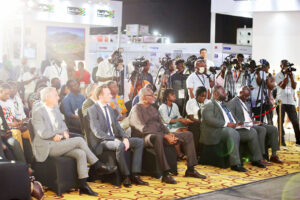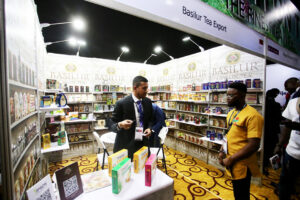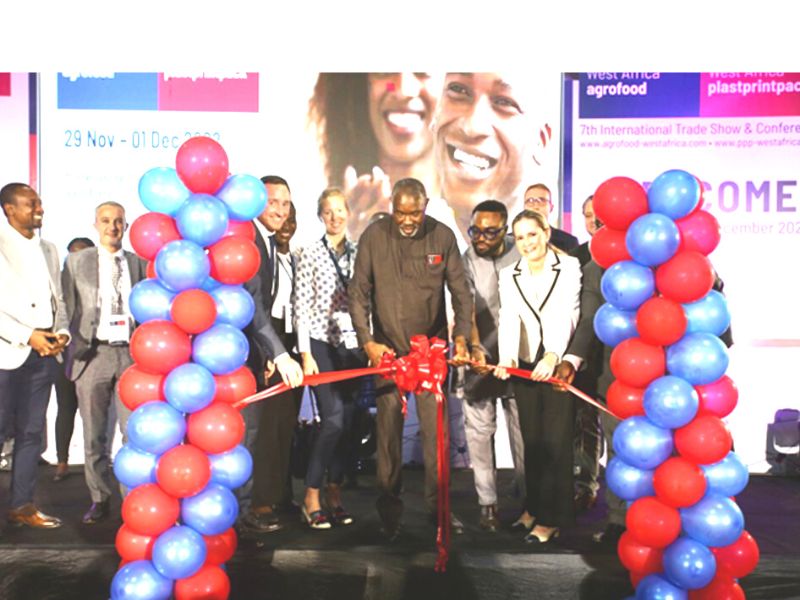
The Great Hall of the Accra International Conference Center was busy with activities yesterday, as the 7th Agrofood and plastprintpack conference kick-started. The purpose of the conference is to discuss technologies needed to improve the entire agricultural value chain and help increase West Africa’s self-sufficiency and improve supply constantly.
The event will witness the mounting of pavilions from six countries namely; Germany, Iran, Italy, the Netherlands, South Africa and Sri Lanka. More than 90 exhibitors from 20 countries will also showcase products in the agric technologies and other areas tailored for the West African market.
The program was put together by Fairtrade, with support from Geovision. Present at the event were ambassadors and representatives from countries such as Germany, the Netherlands and Italy.
In Ghana, representatives from Ministry of Food and Agriculture, Ghana Export Promotion Authority, Ghana Investment Promotion Center, Ghana Enterprises Agency, Association of Ghana Industries and many more, were there to take advantage of the many opportunities that the event presents.
Addressing the audience, Mr Paul Marz, Managing Director of Fairtrade noted that one must attach importance to food trade in West Africa, because it has a market share of US$30bn in the sub-region.
Quoting German Engineering Association, VDMA, he said the sub-regions food and beverage technology imports has seen an increase from €496m in 2015 to €694m in 2021, representing about 5.8% increase.

The VDMA data also shows imports of agricultural machinery have reached around €200m annually, while imports of packaging technology has seen a rise from €230m in 2015 to €312 in 202, MrMärz said and urged exhibitors to take advantage of the conference and tap into the opportunities available.
The Director of Plant Protection Services, Mr Eric Bentsil Quaye, who spoke on behalf of MoFA, admitted that agriculture is the backbone of Ghana’s economy and continues to contribute significantly to the country’s GDP, as well as export.
He said the Ministry has, through the Planting for Food and Jobs program,sustained the Ghanaian food economy to some extent.
“I am happy, however, to say that government flagship program, that is the Planting for Food and Jobs, is yielding results as it has sustained Ghana’s food economy to some extent.”
He, however, noted that farmers in the sub-region are currently facing hardships in their farming activities, as a result of global events, including COVID-19 and climate change, which has resulted in some form of food insecurity and hence, acknowledged that new methods must be adopted to meet these trying times.
He said what the government is doing in its own way to salvage the situation is the promotion of sustainable agriculture and thriving agribusiness through research and technology development and other support services to farmers, processors and traders.
The Ministry is also analysing the medium term agriculture plan in order to optimise agriculture and integrated rural development, structural transformation and the socio-economic development of Ghana, he indicated.
Again, the Ministry is currently intensifying its effort to reduce the importation of fertilizers by encouraging the private sector to make investment in organic fertilizers, he added.
“MoFA is also taking steps to provide adequate warehousing facilities to prevent post-harvest loses which is usually associated with harvest,” Mr Quaye said, adding that “All these measures are intended to boost production and increase volumes of output from farmers.”
He,however, noted that government cannot do it alone and hence called on Ghanaian farmers, processors and all those in the agriculture value chain to tap into the opportunities available at the event to develop the sector so that the country can compete globally in the area of agriculture.
The Italian Ambassador to Ghana and Togo, Ms Daniela d’Orlandi, who also addressed the audience called on Ghanaian companies in agribusiness to learn more about the possibilities Italian companies can offer to upgrade local production, so that they can meet domestic and global demands.
Other Ambassadors and representatives from other countries made similar calls.









